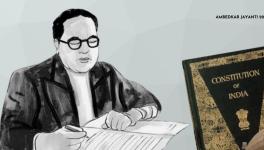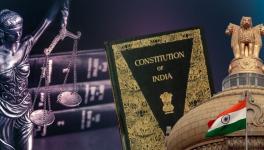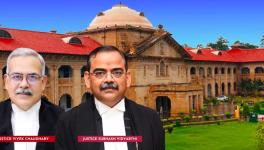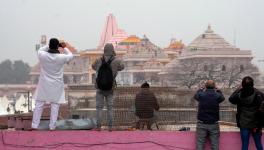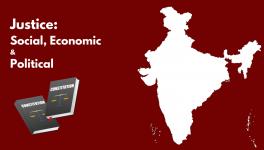Cubans Overwhelmingly Vote in Favor of the New Constitution

Cuban president Miguel Diaz Canel votes during the referendum to approve the constitutional reform in Havana, Cuba on February 24. (Photo: Ramon Espinosa/AP)
60 years after revolutionaries defeated the US-supported Batista regime, in what came to be known as the 26th of July Movement, Cubans prepare to reaffirm their faith in the values of the revolution. The results declared of the constitutional referendum that was declared on January 25, had over 86.85% of those voting, or around 73.3% of the nation’s electorate, ratifying the draft constitution that was unanimously approved by the National Assembly of People’s Power on December 22. The referendum had over 84.4% of the electorate vote on the Cuban equivalent of the Magna Carta, which in itself was drafted after consultations with the Cuban people. Let us briefly take a look at both the history and the process that went behind the making of the constitution.
Making of the Constitution
Earlier in 2018, a special committee headed by Raul Castro prepared a new draft constitution to address the changing socio-economic realities of the country and the world, keeping intact the socialist character of the Republic and the role of the Communist Party in the society. It aims to modernize the state and its legal structure, and to reaffirm the rights and guarantees of its citizens. It was approved by the National Assembly on July 23 and presented before the Cuban citizens for their suggestions.
The draft of the new constitution was then discussed and debated in around 133,000 nationwide people’s discussion meetings. The meetings were held between August 13 and November 15 and had over 9 million participants. From these consultation meetings, about 783,000 proposals for modification, addition or deletion of articles emerged. Inés María Chapman, national deputy and vice-president of the Council of State and Ministers, in relation to the original project, said that almost 60% of its content had been modified after the consultations made with people in different spaces, neighborhoods and workplaces, “which demonstrates the democratic nature of the process”.
The new draft has adopted 11 articles, amended 113 and dropped 13 from the 1976 Constitution, while adding 87 more. The original draft itself underwent over 760 changes throughout the whole process. Creation of the offices of the President and the Prime Minister, promotion of foreign investments and recognition of various forms of property – public, cooperative and private – are some of the significant provisions and reforms drafted in the new constitution.
Socialist polity, Communist aspiration, and the question of private property
In July 2018, when the first draft was opened up for scrutiny and opinions from the people, a very conspicuous omission was noticed: the aim of building a communist society. Although the draft continued to maintain that the Cuban state would remain socialist, questions were raised whether the new government intended to move away from communism because the omission coincided with the recognition of private property. After public consultations and various amendments, the final draft that was adopted by the National Assembly eventually undid the omission.
While the people’s will of keeping the aspiration towards communism, as something institutionalized through the constitution, prevailed, the provisions to recognize private property also remained. History tells us that property relations, ideological unity and state socialism have a very complex relationship. In many ways, the Cuban constitution process has been an exercise in recognizing the existence of, and through recognition the regulation of, different forms of property. While the government did go through a rigorous nationalization drive of major industries, Cuban individuals and families continued to own properties of different kinds in the immediate aftermath of the revolution. Most of these properties, like houses and small enterprises, were means of sustenance or petty production that were not extractive or accumulation-oriented but lacked constitutional, if not legal, recognition. A recognition of that and other kinds of properties, including cooperatives and public enterprises, was only a matter of regularizing what already existed in harmony with the socialist principles of the state. Cuba, in this respect, learned from the experiences of China, Vietnam, the Soviet Union and other experiments in socialism, when clarifying the state’s relationship with property rights.
LGBTQ Rights
Six decades after the revolution, Cuban society still has undertones of conservatism. During and after the Revolution, the revolutionaries themselves enacted the socially prevalent homophobia in their treatment of sexual minorities at the time. But this history was also muddied in the political developments of the Cold War. Great progress has been achieved in this front since then. In 1975, the People’s Supreme Court ruled in favor of a group of artists, seeking compensation for discriminatory practices in their workplace, heralding a new era of progress towards better rights for sexual minorities. In 1979, Cuba became among the first nations in Latin America to decriminalize same-sex relations. By the 1980s, the government began campaigns to educate the masses about homosexuality as a variant of human sexuality through the ministries of culture and education. By the turn of the 21st century, the government began the process of admitting to past injustices, with an apology from Fidel Castro no less, and mending its policies for the betterment of the LGBTQ citizens.
The new constitution-making process seeks to recognize these advancements and institutionalize the changes achieved so far. One matter of contention that came up was the matter of explicit recognition of same-sex marriage, sought through a change in definition of marriage in the draft constitution. In discussions and meetings, it was found that while opinions were divided, there was significant support for the recognition of marriage outside of the hetero-normative conception. Eventually, the National Assembly decided to omit the definition of marriage, leaving it to be decided in the family code and not the constitution. Nevertheless, marriage as a contract between two partners remained, without specifying the definition of the parties that are and are not allowed to enter it.
Redefining Democracy
What stands out in the whole process is the manner in which it is done. There is a constant back-and-forth with the people, with almost the entirety of the island nation’s adult population actively participating in it. But this is nothing new for Cuba. Since the late 1990s, Cuban citizens have made active use of their membership in the Committees for the Defense of the Revolution (CDRs) and the Communist Party of Cuba (PCC) to directly participate in the process of the government. Even though the PCC has only about 700,000 members, the party congresses have often gone beyond the members and reached out to the citizens. The outreach and mass participation through the CDRs and other popular forums became crucial in formulating the party’s periodic Guideline on the Economic and Social Policy, which by default became guiding principles of the government policies and decision. This experiment in democracy has yielded impressive results for a country that has been under criminal embargo imposed by the United States for six decades, especially so after the loss of a key trade partner in the Soviet Union and the economic crisis of the 1990s that it survived.
It is this very practice in democracy that makes Cuba stand out from experiments of both state socialism and electoral democracies. And this is apart from the tremendous feats in health and human development, and betterment of living standards that the island has achieved, despite having been beleaguered by imperialism from right next door. As the nation is set to begin a new chapter in its history, the constitutional experiment stands as a testament to the success of the revolution.
Get the latest reports & analysis with people's perspective on Protests, movements & deep analytical videos, discussions of the current affairs in your Telegram app. Subscribe to NewsClick's Telegram channel & get Real-Time updates on stories, as they get published on our website.










